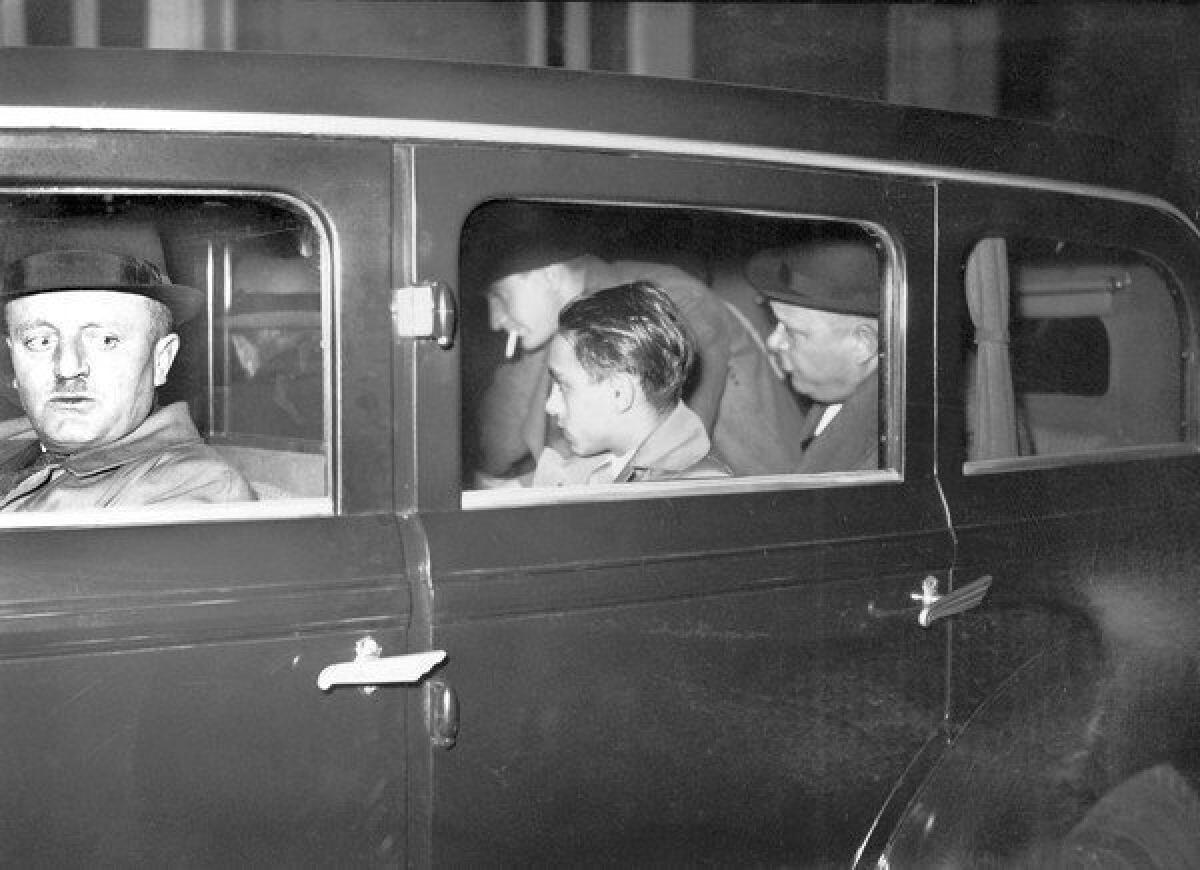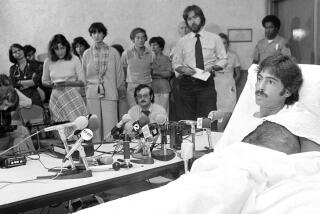The boy behind Kristallnacht

- Share via
On the night of Nov. 7, 1938, at the German Embassy in Paris, a 17-year-old Polish Jew named Herschel Grynszpan gained access to the office of a low-ranking Nazi named Ernst vom Rath by promising to turn over an “important document.” Instead, Grynszpan fired five bullets at Rath; only two of them hit their target, but one proved fatal. Despite multiple transfusions of good French blood and the ministrations of Hitler’s personal physician, Rath died two days later in a Paris clinic.
As would become painfully evident, this assassination was immediately exploited by the Nazis as a pretext for launching a massive pogrom against the Jews of Germany. The violence on the night of Nov. 9-10 spread across the country, resulting in 91 fatalities, more than 7,000 destroyed Jewish businesses, and some 1,000 torched synagogues. Glass crystals from broken shop windows gave rise to the euphemistic term for this bloody pogrom: Kristallnacht.
While Grynszpan’s link to Kristallnacht appears in most histories of the Third Reich and the Holocaust, little has been written about the assassin or, for that matter, his victim. Indeed, in the annals of political assassinations, this one is quite odd. Generally, one of the parties is an important historical figure — typically it’s the victim — but in the Grynszpan case, only the consequences of the deed, not the deed itself or its principals, have received attention.
In his well-crafted study, “The Short, Strange Life of Herschel Grynszpan: A Boy Avenger, a Nazi Diplomat, and a Murder in Paris,” Jonathan Kirsch manages to put some meat on the skinny frame of his protagonist and also to put a human face on his victim. In so doing, Kirsch has made a valuable contribution to our understanding of Kristallnacht, whose 75th anniversary falls this year.
The author’s achievement did not come about by accident. Kirsch, who is both a lawyer and an accomplished historian (as well as a longtime reviewer for The Times and son of the late Robert Kirsch, former Times book critic), has just the right credentials to tackle a subject like this one, which conjoins totalitarian politics, legal wrangling and more than a hint of personal and religious megalomania. In his previous work, Kirsch has written acutely on the nexus between end-of-times religiosity, witch-hunting politics and terror in the name of “higher” ends.
But just who was Herschel Grynszpan, the young man whose “short, strange life” Kirsch sets out to unlock with his handy tool kit of talents? In the author’s telling, he emerges as a contradictory character: small in stature, sickly, a mediocre student, yet at the same time a tough and cunning scrapper who, seeing all the abuses visited upon his people by the Nazis, began while still quite young to dream of exacting revenge upon the Germans.
He did much of this dreaming not in Germany, where he was born into a family of poor Jewish émigrés from Poland, but in France, where his parents sent him at age 15 to escape the growing persecution at home. Of course, France itself was hardly free of anti-Semitism, especially in the year of Grynszpan’s arrival, 1936, when local racists were protesting the Popular Front government of Léon Blum, France’s first Jewish prime minister. The phrase “Better Hitler Than Blum” echoed through the streets of Paris.
What prompted Grynszpan to strike out against the Germans, however, was not what he was witnessing in France, but a brutal action by Hitler’s government: the deportation of 12,000 Ostjuden (Eastern Jews), including Grynszpan’s parents, to a no-man’s land on the German-Polish border.
Determined to avenge the cruel treatment of his parents and other Jews, Grynszpan procured a revolver at a Paris shop. As Kirsch wryly notes, getting a gun in France then was as easy as it is now in America. Actually, it was harder in France: Certified lunatics could not purchase arms.
Specific details of Grynszpan’s fateful deed in Rath’s office were contradictory. The shooter was the only surviving witness (Rath fell into a coma and never regained consciousness), and Grynszpan, a congenital fabulist, offered conflicting accounts of what actually transpired. Only one thing was certain: The assassin fully expected to be hailed as a hero among Jews around the world.
Instead, he was vilified by just about everyone, especially by German Jews, who feared his act would bring down fresh hell upon their heads. Of course, they were right, and to the extent that Grynszpan is remembered at all it is as the guy who “caused” Kristallnacht. It is Kirsch’s contention that instead of being blamed for Kristallnacht, Grynszpan should be placed in the pantheon of Jewish resistance fighters. (By contrast, Gavrilo Princip, the young man whose assassination of Austrian Archduke Franz Ferdinand “lit the fuse” for World War I, was hailed by Serbs as a national hero. Princip later got a plaque in Sarajevo; Grynszpan has gotten nothing, not even a T-shirt in Tel Aviv.)
As for Kristallnacht, Kirsch’s treatment of this infamous pogrom hews closely to the conventional script. Although he wisely stays clear of the boggy historical debates over whether this action was part of a continuum or a “break” from previous policy, he clearly favors the continuum argument. In any case, what makes this book so interesting is what happened to Grynszpan after the pogrom.
The story now takes on bizarre twists and turns, including the argument, eventually deployed successfully by Grynszpan, that both he and his victim were gay and that the killing was a crime passionel. We don’t know whether this is true (it’s highly doubtful), but the possibility that it might be kept Grynszpan, who languished through the war years in German prisons, from being shot until early 1945.
Or was he shot? Rumor had it that he survived the Nazi camps to become (secretly, of course) an automobile mechanic in Paris. It’s only fitting that this mystery-filled saga should end with a ghost story.
Large is the author of “Munich 1972: Tragedy, Terror, and Triumph at the Olympic Games.”
The Short, Strange Life of Herschel Grynszpan
A Boy Avenger, a Nazi Diplomat, and a Murder in Paris
Jonathan Kirsch
Liveright: 352 pp, $27.95
More to Read
Sign up for our Book Club newsletter
Get the latest news, events and more from the Los Angeles Times Book Club, and help us get L.A. reading and talking.
You may occasionally receive promotional content from the Los Angeles Times.






